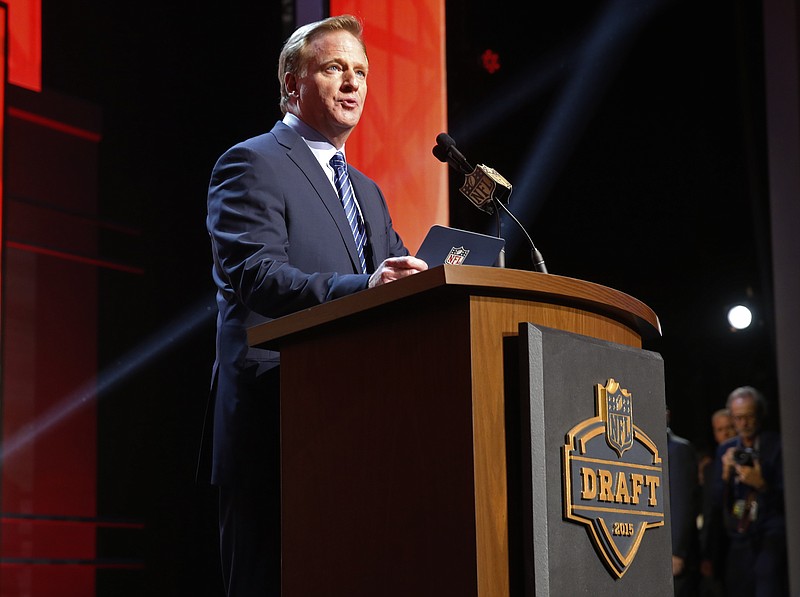By the end of Saturday's final round of the NFL Draft, 256 players were drafted out of college and into the pros.
How lucky they are.
How cursed they are.
Last year, somewhere between news about Ray Rice and Adrian Peterson, the NFL admitted this: Nearly 30 percent of its former players will develop brain diseases, such as Alzheimer's or dementia.
By that math, that means 77 of those 256 players will develop some form of debilitating brain disease.
Will it be Amari Cooper?
Or Todd Gurley?
Maybe Jameis Winston?
The NFL's 30-percent-curse makes the draft a form of Russian roulette: Who will be left standing -- brain fully functioning -- when pro careers are over?
It also gives Draft Day a stockyard-esque quality, as if symbolically we behead these players, caring only for what their bodies can do, but not their minds. It seems like dystopian entertainment -- the athletic version of the "Hunger Games" -- to think the American sports world grinds to a halt to cheer on 256 young men to fame, fortune and possible brain disease.
(Will it be Dante Fowler who becomes the next Junior Seau? Or Vic Beasley? Is that cruel to ask? Isn't it more reckless not to?)
The writer Steve Almond envisions a new form of Draft Day where the commissioner does the standard photo-op jersey presentation, then also hands players and their families a waiver that reads:
I, _________________, the undersigned, am aware that the average age of death of an NFL player is, according to the Players Union, up to two decades shorter than normal life expectancy. Furthermore, I recognize that playing in the League, even in the absence of formally diagnosed concussions, may cause brain damage leading to the loss of cognitive function, depression, disorientation, and suicidal ideation.
Then, players are asked to watch video testimony of former players who suffer from dementia, or Alzheimer's, or suicidal tendencies.
"That would be informed consent," Almond writes in "Against Football."
The tide seems to be going out on pro football culture. Yes, the NFL had huge ratings last year. Yes, it hopes to reach $25 billion in annual revenues. But on Draft Day, fans booed Commissioner Roger Goodell, multiple times, as if saying: We need new leadership. We need leadership that can save this game.
Then, NFL legend Joe Namath told West Palm Beach's WPBF-TV that had he known the brain risks, he would not have played football.
"This instrument that we have, that we have been blessed with ... it's not designed for the kind of contact or physical abuse your body gets playing this sport," he said, reminiscent of last season's decision by Chris Borland, 24, to walk away from the game for those very reasons.
The NFL has something on its heels. It's the American conscience. It's our morality, trying to reconcile a love for football with the damage it can do.
"First, I'm a proponent of football. I have five sons and all have played," said Dr. Bill Moore Smith, an expert on medicine and athletics. "At the same time, we've got an epidemic on our hands we didn't see coming."
Smith is director of UT-Erlanger Institute for Sports and Health, and team physician for University of Tennessee at Chattanooga. He said not all news out of football is bad.
"At the youth level, we're better off now than we've ever been. Fewer concussions than we've ever had. More heads-up tackling. More certified coaches," he said during a recent teleconference discussing Erlanger hospital's upcoming annual neurology conference.
On May 15 this year's conference will focus on sports concussions. (There's a discounted $15 ticket for parents, players, coaches and trainers.) The keynote speaker is Dr. Thor Stein, who was part of PBS' "League of Denial" documentary and studies chronic traumatic encephalopathy, or CTE, at Boston University.
"Over 80 percent of NFL players who have come to us have shown some signs of CTE," Stein said in the same teleconference.
CTE causes memory trouble, distorts the personality, and deteriorates the body in ways similar to Parkinson's. Stein's CTE research is in its early stages, yet one thing seems clear.
"It's clearly something to do with getting hit over and over and over again that leads you down this degenerative path," he said.
Both Stein and Smith say they are both fans of football, which makes about 150 million of us.
But at some point, our desire for entertainment has to square up with our love for the players we are watching.
Their bodies.
And their minds.
Contact David Cook at dcook@timesfreepress.com or 423-757-6329. Follow him on Facebook at DavidCookTFP.

